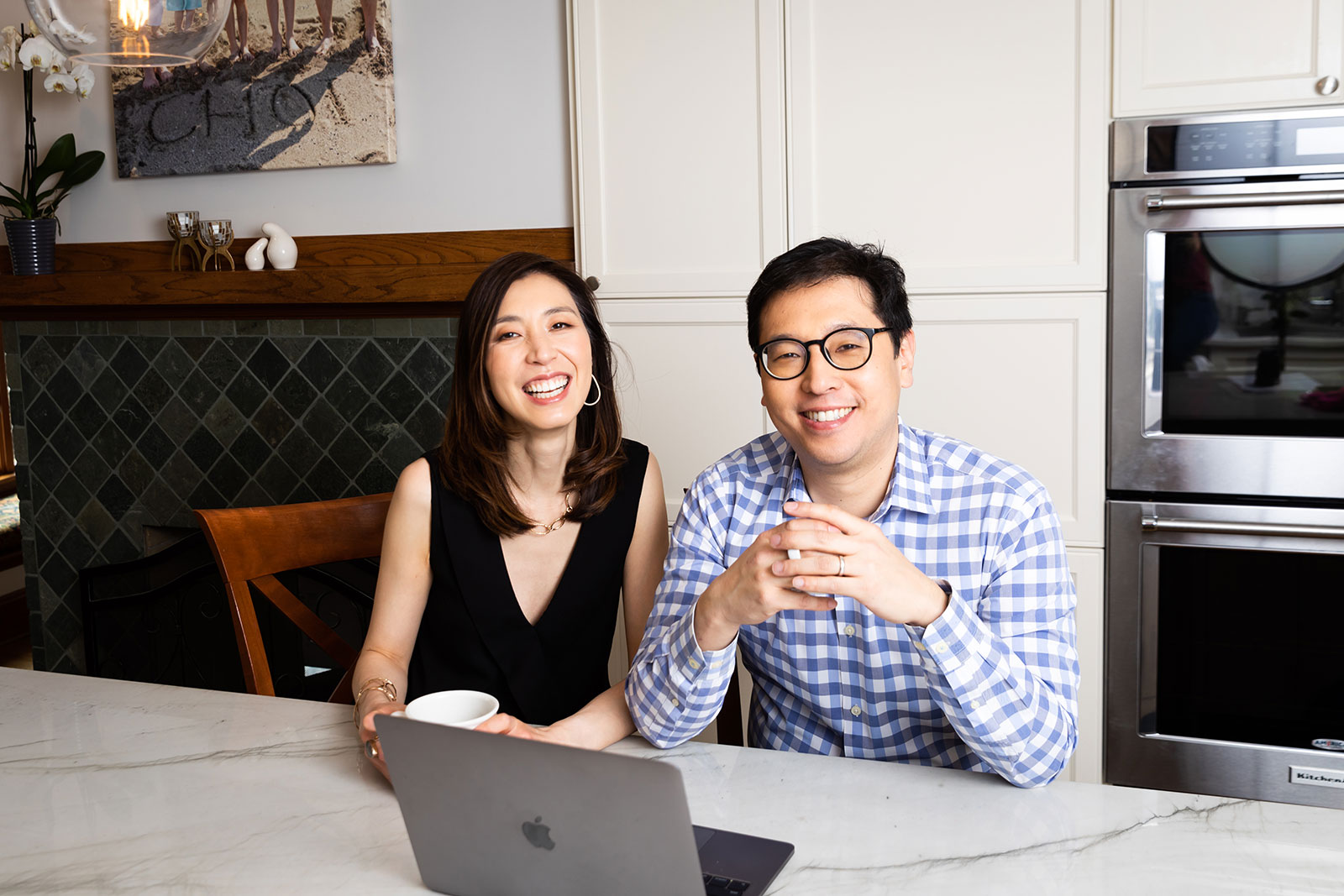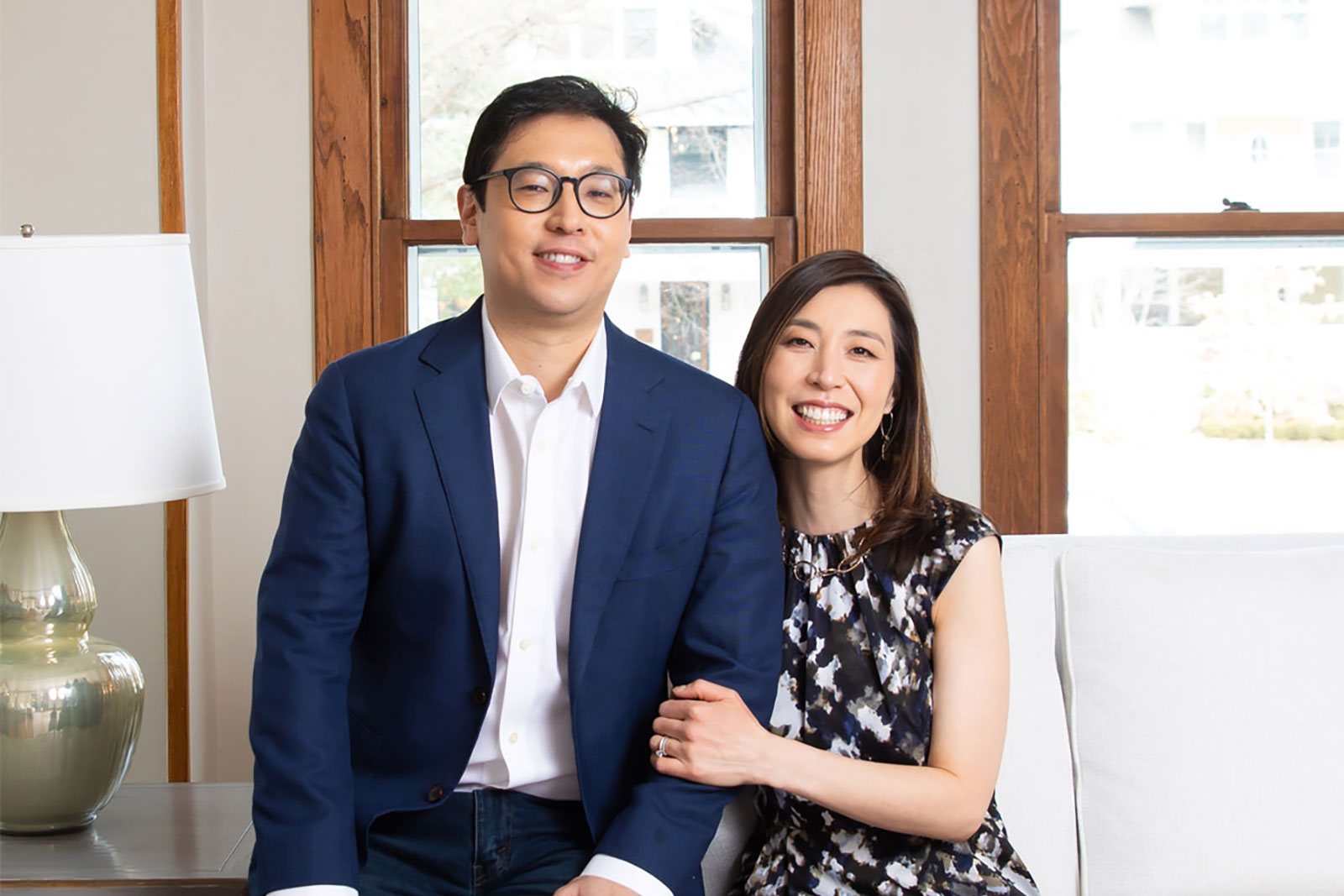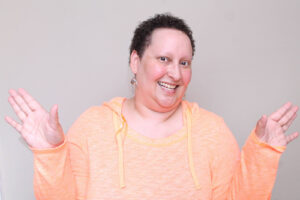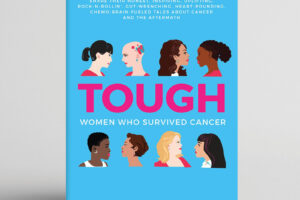Nestled on a quiet block in the North Shore of Chicago live two of the country’s leaders in the oncodermatology field. Drs. Jenniferaand Jaehyuk Choi, who launched and currently run Northwestern University’s oncodermatology division (the first of its kind in the nation), are not only breaking ground in the rapidly expanding field of research on the side effects of new immunotherapy and other cancer treatments, they also happen to be the happily married parents of three daughters. To call them a power couple would be an understatement.
On a chilly day in early March, the Chois welcomed us into their new home. Its minimalist design, which might have seemed vast and stately, was offset by endearing knickknacks, like oversized photo prints of the family of five on a beach vacation. One daughter was home sick, and although she was supposed to be resting, she often snuck downstairs to greet our staff or find comfort in her parents’ arms.
The Cancer Wellness team caught the Chois on a morning off, a rarity for this dual-physician household. While most parents would find it challenging to manage the rigorous demands of running an emerging research lab at one of the top universities in the world with regular patient visits and quality family time, the Chois balance it all with ease. That’s likely because Jennifer and Jaehyuk have been in it (meaning work and research and friendship and family life) for most of their lives. “It’s totally easy,” Jaehyuk jokes. “We employ a legion of robots.”
The two met during their freshman year of college at Harvard University. They were just friends at the time, and they both went on to study medicine at Yale. Jennifer stayed on at Yale for a fifth year of research while Jaehyuk received his M.D.-Ph.D., and after nine years of friendship, they eventually began dating. They were engaged nine months later and married six months after that. “Once I decided on derm, he then decided on derm because of his research,” says Jennifer, who was a year ahead of him. “At one point, I was his attending.”
Each Choi had their own reasoning for entering the field of oncodermatology. Epidermal growth factor receptor inhibitors, which block the protein epidermal growth factor receptor found in high levels on cancer cells, had just been released to the market during Jennifer’s dermatology residency, and they produced a unique, acne-like rash on the face, chest, and back. It differed compared to previous cancer treatments, which intrigued Jennifer. “This [was] really tough because they’re sitting here, trying to battle their cancer, and yet they have to deal with this thing that’s so visible,” she says.
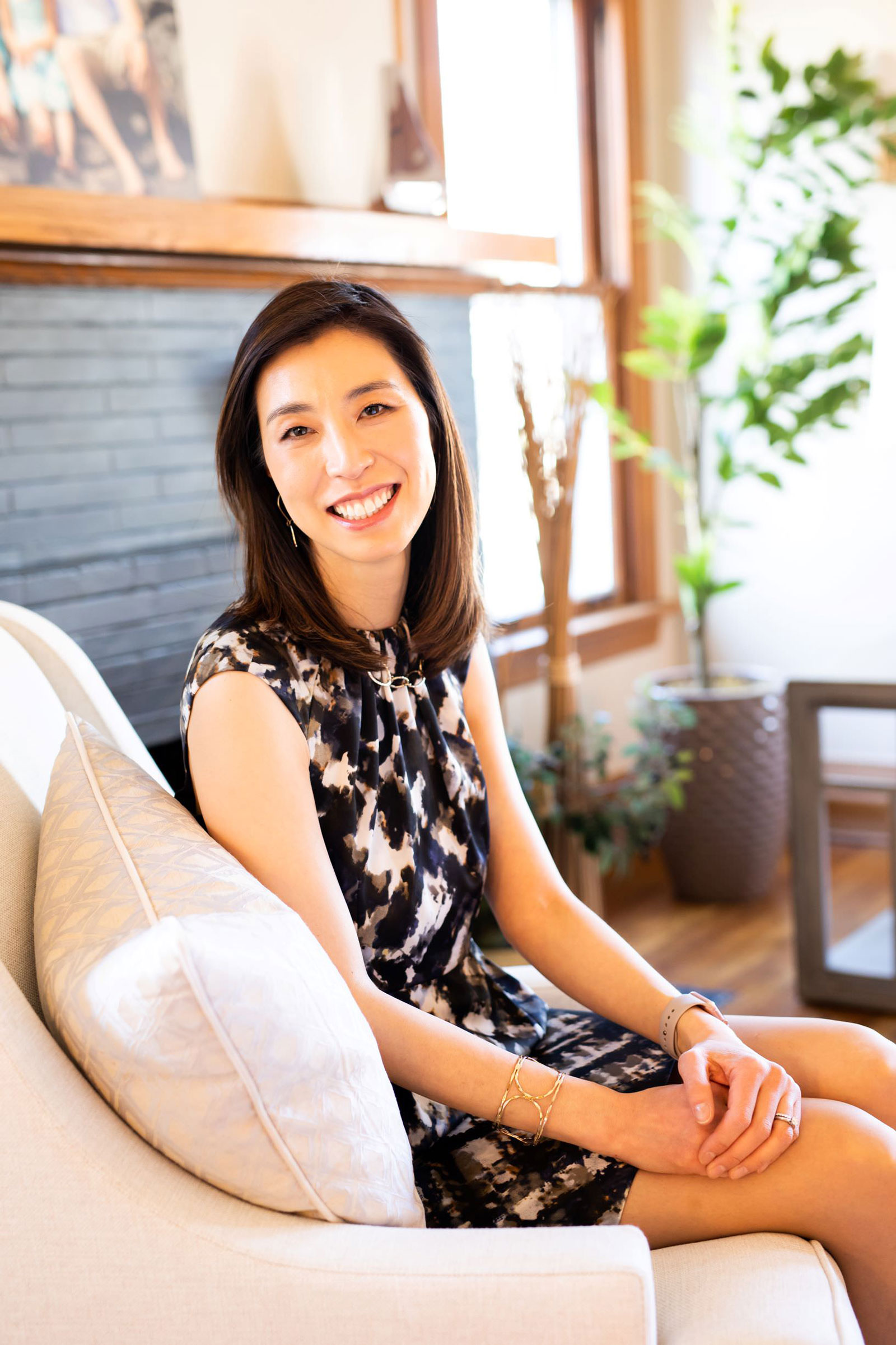 “I want our division and our department to be the best in the world,” Jennifer says about their work. That means providing the most cutting-edge treatment, staying at the forefront of describing different reactions from new cancer therapies, and conducting research to figure out why these reactions are happening and how to prevent them. Jaehyuk’s philosophy, while similar, is also more straightforward. “When I talk to patients, they ask me questions, and in the lab, we try to answer the questions,” he says. “If I can bring back and actually impact, improve patient care, [that] is my personal goal.”
“I want our division and our department to be the best in the world,” Jennifer says about their work. That means providing the most cutting-edge treatment, staying at the forefront of describing different reactions from new cancer therapies, and conducting research to figure out why these reactions are happening and how to prevent them. Jaehyuk’s philosophy, while similar, is also more straightforward. “When I talk to patients, they ask me questions, and in the lab, we try to answer the questions,” he says. “If I can bring back and actually impact, improve patient care, [that] is my personal goal.”
The blend of the scientific and the humanistic has made the Chois absolute rock stars in the oncodermatology world. In 2018, the two received the Compassionate Care Award from the Melanoma Research Foundation at Chicago’s Wings of Hope gala. “Your patient relationship is the reward that you get, ultimately, so you don’t really expect anything else,” Jaehyuk says about the award. “So it’s just an amazing opportunity to see not only that people think that we may be eligible for the award, but that other people think it’s important to recognize compassionate care.”
For the Chois, the Compassionate Care Award is not just a title. Compassion is embedded into the very ethos of their professional care. “Cancer is really like a 360 [degree] diagnosis. You have it, and then your parents have it, your kids have it, your cousins have it. It’s really a whole family thing,” Jaehyuk says. “It’s a very emotional diagnosis to have. I feel like every patient feels like they never have enough information or enough support because it affects so many aspects of your life. I wanted to dedicate my life to try to make their lives better.”
Someone asked me, why do you want to be a doctor? And I said I thought it was really a privilege because people trust you with their lives.
-Dr. Jaehyuk Choi
Northwestern has allowed their patient-centered philosophy to shine. “It’s not like our research is the most important thing,” Jennifer begins. “You are the most important thing.” She aims to treat every patient like they’re a family member, going the extra mile and thinking outside the box to offer treatment that goes beyond what other medical professionals are recommending. “When you see a unique problem, can you think outside the box because you’re using the knowledge that you have to say even though this is something that we don’t necessarily do all the time, we’re going to try this because […] we’re not going to give up?” Jennifer questions. “Let’s figure this out with you.”
Hope is the key here. “Even when you are going through a really rough time, […] sometimes there is all of a sudden a better outcome than you expect [because] you can hold on to hope, and that hope is so important to live with,” Jennifer says.
Compassionate care also means treating patients like human beings. A 2016 study out of Iran found therapeutic touch to be beneficial to the survival and well-being of people with cancer. “An affirmation can be made regarding the use of T.T. (therapeutic touch), as a noninvasive intervention for improving the health status in patients with cancer,” the study states. “Moreover, therapeutic touch was proved to be a useful strategy for adult patients with cancer.”
Jennifer uses this philosophy by holding her patient’s hands or offering them hugs. “As a physician, I try to really just show them that I care for what they’re going through, that I’m trying to empathize with them, that this is really tough, but you can go through this,” she says. This outlook, Jennifer says, stems from chats with her mother who saw numerous oncologists because she lived with stage III pancreatic cancer for seven years. “She would always say, I don’t care about the doctor who knows the most. The one that helped me the most was the one that told me she cared, and that she would just sit there and hold my hand,” Jennifer remembers.
And while working together may prove to be a challenge for some couples, Jennifer and Jaehyuk value their time as a team.
It’s not like our research is the most important thing. You are the most important thing.
-Dr. Jennifer Choi
“I remember when I was choosing my specialty, one of my mentors said to me, ‘Jae, my wife and I work in the same place. We’re a one-car couple. Sometimes it’s better not to be a one-car couple.’ But I work in the same place, the same department, and it’s actually been an amazing experience,” says Jaehyuk. “I learned a lot from her, and we support each other through a lot of common experience.”
Those experiences, from breaking new medical ground to empathetically working with patients to winning awards, have proven the Chois are an unmatched and one-of-a-kind duo. “We feel very privileged because we like what we do,” Jaehyuk adds. “I think that helps everything, [because] we don’t do it for any other reason besides the fact that we love it.”
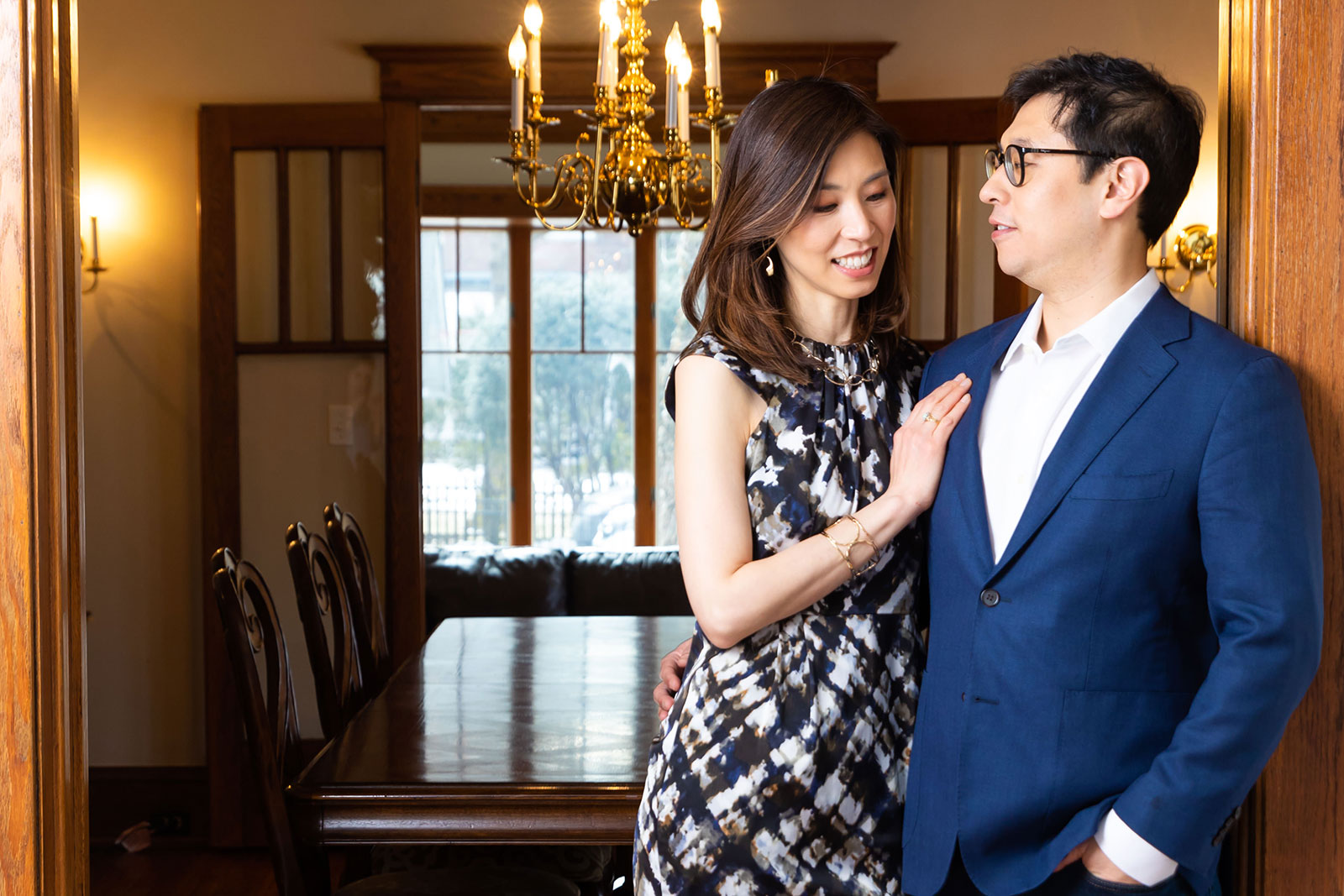

Photos by Robin Subar
She was also inspired to enter the field after her mother was diagnosed with advanced stage III pancreatic cancer. The experience, she says, was devastating to her family. “I think that helped to drive my passion […] because I was able to witness the suffering and the battle, the worry that somebody goes through [when she was] battling cancer,” Jennifer says. “It made me extra passionate. If you are undergoing this treatment, and if you’re dealing with something on your skin, whether it’s rashes or pain or swelling of your hands and feet, if I can help you, that’s the role I want to play.”
